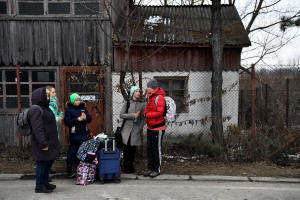Russian attacks in western Ukraine prompt more people to flee
 Send a link to a friend
Send a link to a friend
 [March 14, 2022]
By Mari Saito and Fedja Grulovic [March 14, 2022]
By Mari Saito and Fedja Grulovic
KRAKOW, Poland/ISACCEA, Romania (Reuters) -
People fleeing what until recently had been the relative safety of
western Ukraine joined thousands crossing into eastern Europe on Monday
after Russia stepped up attacks, prompting fears of an even larger
exodus.
Moscow widened its assault on Sunday with an attack on a base near the
border with NATO member Poland. Ukraine said 35 people were killed at
the base while Moscow said up to 180 "foreign mercenaries" died and a
large number of foreign weapons were destroyed. Ukraine also reported
renewed air strikes on an airport in the west of the country.
With the war well into its third week, the number of refugees fleeing
the Russian invasion has already reached 2.7 million, the U.N. data
showed, in what has become Europe's fastest growing refugee crisis since
World War Two.
However, millions of people have also been displaced inside Ukraine,
with many evacuated only as far as the western regions, including to
cities like Lviv.

Myroslava, 52, fled her home in the Ternopil region, in western Ukraine,
and was waiting in a terminal of Krakow station in Poland to be picked
by up acquaintances. She did not know where she would go to stay.
"We left because of the attack yesterday," she said, adding that she had
hoped western Ukraine would be safe for the time being. "We weren't
planning to leave, but as it was so close we decided to."
Mira from Kyiv, who was traveling with her mother to Warsaw, said she
had been surprised by the Russian attack near Lviv. "I just panicked and
felt scared," she said. "I had to calm myself down because we need to
keep moving."
DIPLOMATIC PUSH
Meanwhile, battles dragged on around many of Ukraine's main cities,
including the capital Kyiv, though some progress had been made in
funnelling civilians away from the fighting with Ukraine saying it would
try to evacuate through 10 humanitarian corridors on Monday.
Russia denies targeting civilians, describing its actions as a "special
operation" to demilitarise and "de-Nazify" Ukraine. Ukraine and Western
allies call this a baseless pretext for a war of choice.
"Houses were blown up," Alena Kasinyska, a refugee from the hard-hit
town of Mykolaiv, in southern Ukraine, said after crossing into Romania
at Isaccea, a busy border crossing in the Danube delta. "People have no
place to live, we are scared."

[to top of second column]
|

A family wait for transport after fleeing from Ukraine to Romania,
following Russia's invasion of Ukraine, at the border crossing in
Siret, Romania, March 13, 2022. REUTERS/Clodagh Kilcoyne
 A glimmer of hope came after
Ukrainian and Russian negotiators in talks to end the conflict cited
progress over the weekend.
After several inconclusive meetings, officials of suggested there
could be positive results within days ahead of the talks, which
where due to begin at 0830 GMT.
Authorities and volunteers across central and eastern Europe have
spent the weeks since the invasion began on Feb. 24 scrambling to
provide food, accommodation and medical aid to the many thousands of
refugees pouring across their borders.
Frontline states such as Poland, which has welcomed well over half
of the total number of fleeing, and Slovakia, Romania, Hungary and
Moldova, have taken in the vast majority of the refugees, some of
which have then headed on further west.
Poland's border guard said about 1.76 million people had entered the
country since the fighting started, with 18,400 arriving during the
early hours of Monday alone.
"We estimate that for sure over 1 million Ukrainians have remained
in Poland and we must do everything to ensure their safety," Polish
Deputy Minister of Internal Affairs Pawel Szefernaker told private
television channel TVN24.

Sympathy over the plight of their neighbours and deep-set memories
of Moscow's dominance has seen a groundswell of volunteer efforts,
but the sheer scale of the refugee crisis has also sparked worries
of being overwhelmed.
Some countries further away from Ukraine's borders, such as the
Czech Republic, have also taken in tens of thousands of refugees,
piling pressure on local authorities, while others, like Lithuania,
have only just begun to receive significant numbers.
(Additional reporting by Pawel Florkiewicz in Warsaw, Andrius Sytas
in Vilnius, Krisztina Than in Budapest, Robert Muller and Jan
Lopatka in Prague, and Luiza Ilie in Bucharest; Writing by Niklas
Pollard; Editing by Raissa Kasolowsky)
[© 2022 Thomson Reuters. All rights
reserved.] This material may not be published,
broadcast, rewritten or redistributed.
Thompson Reuters is solely responsible for this content. |